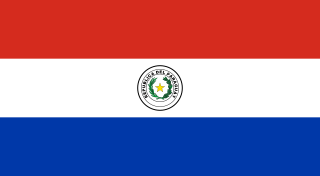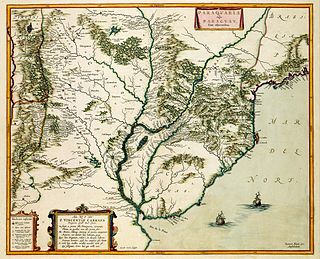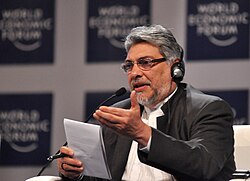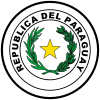
Paraguay, officially the Republic of Paraguay, is a landlocked country in South America. It is bordered by Argentina to the south and southwest, Brazil to the east and northeast, and Bolivia to the northwest. It has a population of around 7.4 million, nearly 3 million of whom live in the capital and largest city of Asunción, and its surrounding metro area.

The Authentic Radical Liberal Party is a centrist to centre-left liberal and radical political party in Paraguay. The party is a full member of Liberal International. The liberales, as they are known, are the leading opposition to the dominant conservative Colorado Party. They have taken this position since the end of the Alfredo Stroessner dictatorship in 1989. They are the political successors of the Liberal Party, which traces its history back to 10 July 1887.

Luis María del Corazón de Jesús Dionisio Argaña Ferraro was a Paraguayan politician and jurist. A prominent and influential member of the Colorado Party, he was a Supreme Court judge, unsuccessfully ran for the Colorado Party's nomination for president in the 1993 election and eventually was elected Vice-President in the 1998 election, but was assassinated seven months after assuming office in March 1999 at a time when it appeared likely that he would inherit the presidency from Raúl Cubas, who was on the verge of being impeached. The incident and its aftermath is known in Paraguay as Marzo paraguayo. An airport in Paraguay, Dr. Luis María Argaña International Airport, is named for him.


Fernando Armindo Lugo Méndez is a Paraguayan politician and laicized Catholic bishop who was President of Paraguay from 2008 to 2012. Previously he was a Roman Catholic priest and bishop, serving as Bishop of the Diocese of San Pedro from 1994 to 2005. He was elected as president in 2008, an election that ended 61 years of rule by the Colorado Party.

Julio César Ramón Franco Gómez is a Paraguayan politician of the Authentic Radical Liberal Party. He was vice president from 2000 to 2002, served as senator from 1998 to 2003, and was presidential candidate for the Authentic Radical Liberal Party in the 2003 election, losing to Nicanor Duarte of the Colorado Party. He was elected to the Senate again in 2008.
First Lady of Paraguay, also called First Lady of the Nation, is the official post of the wife of the president of Paraguay. The official workplace of the Paraguayan first lady is Mburuvicha Róga. The current first lady of Paraguay is Silvana López Moreira, wife of President Mario Abdo Benítez.

Luis Federico Franco Gómez is a Paraguayan politician who was President of Paraguay from June 2012 until August 2013. A member of the Authentic Radical Liberal Party (PLRA), he was elected as Vice President of Paraguay in the 2008 presidential election as the running mate of Fernando Lugo; he took office in August 2008. Following Lugo's impeachment by the Senate on 22 June 2012, he succeeded Lugo as President to complete the presidential mandate until 15 August 2013.
Below is a timeline of the history of Paraguay:
Events from the year 2012 in Paraguay

General elections were held in Paraguay on 21 April 2013. They resulted in a victory for the Colorado Party, which had ruled the country for 60 years before losing power in 2008. The presidential elections were won by the Colorado Party's Horacio Cartes, who defeated Efraín Alegre of the Paraguay Alegre alliance. The Colorado Party also won the most seats in the Senate and Chamber of Deputies.
Blas Nicolás Riquelme Centurión was a Paraguayan politician and businessman. He was a member of the Senate of Paraguay for the Colorado Party from 1989 to 2008, and was elected President of the party, succeeding Luis María Argaña; he resigned in 1994. He was a candidate in the Colorado Party's 1996 primary election for the 1998 presidential election, backed by Lino Oviedo. He was leader of the Movimiento Tradicionalismo Democrático (TRADEM), and one of the major financiers of the Colorado Party. He was President of the Chamber of Industry until 1984.
Carlos Alberto Filizzola Pallarés is a Paraguayan politician. He has been a member of the Senate of Paraguay since 2003, and the President of the political party Party for a Country of Solidarity since its creation in 2000. He was Interior Minister in the government of Fernando Lugo, resigning on 15 June 2012 following violent clashes during an eviction of landless farmers occupying land.

Pedro Efraín Alegre Sasiain is a Paraguayan politician, lawyer, and university professor. President of the Authentic Radical Liberal Party (PLRA), Alegre served as president of the Chamber of Deputies between 2000 and 2001; Senator in 2008; and Minister of Public Work and Communications between 2008 and 2011 in the Fernando Lugo cabinet. He was a presidential candidate in the 2013, 2018, and 2023 general elections, coming second in all three elections and losing to different candidates from the Colorado Party in each of the three elections.
Victor Luís Bernal Garay is a Paraguayan senator for the Colorado Party and the former director of the bi-national hydroelectric enterprise Itaipú. He is an accountant by profession. An official investigation of Bernal's finances began while he was at Itaipú and continued into his years in the Senate. An attempt was made to impeach him, and both he and his wife, María Elizabeth Pleva, spent years engaged in legal battles over charges of embezzlement.

On 31 March 2017, a series of protests began in Paraguay, during which demonstrators set fire to the Congress building. The demonstrations occurred in response to a constitutional amendment that would permit President Horacio Cartes to run for re-election, a move described by the opposition as "a coup". One protester was killed in Paraguay's capital, Asunción, after being hit by a shotgun blast by police. Several protesters, politicians and journalists, as well as police, were reported injured, including one lower-house deputy who had to undergo surgery after being injured by rubber bullets. On 17 April, President Cartes announced that he was resigning from any possible candidacy for a second presidential term. On 26 April, the Chamber of Deputies of Paraguay rejected the proposed constitutional amendment for presidential re-election.

The 1954 Paraguayan coup d'état occurred in May 1954. It was led by Alfredo Stroessner, with the support of Epifanio Méndez Fleitas, and resulted in the overthrow of the government of Federico Chávez. The coup was the culmination of a complex series of political rivalries within the ruling Colorado Party. Approximately 25 people were killed during the putsch, which helped set the stage for the election of Stroessner as president of Paraguay later that year.

The conservative wave, or blue tide, was a right-wing political phenomenon that occurred in the mid-2010s to the early 2020s in Latin America as a direct reaction to the pink tide.

The Marzo paraguayo was a political crisis that occurred in Paraguay because of the assassination of the then-Vice President Luis María Argaña on 23 March 1999. The opposition blamed the then-President, Raúl Cubas Grau, and also the strongman of Paraguayan politics of that time, Lino Oviedo, for the assassination. Argaña's assassination provoked a series of demonstrations by opponents and supporters to Oviedo and the Cubas government, which culminated in clashes in which seven demonstrators opposed to the government died, which resulted in the resignation of Cubas from the presidency.
The I CELAC summit or 2013 CELAC summit was the first ordinary heads of state summit of the Community of Latin American and Caribbean States. It was held on 27 and 28 January 2013 in Santiago, Chile.














